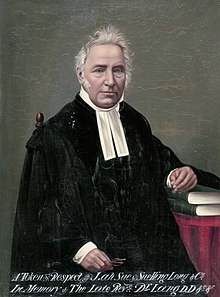John Dunmore Lang
| John Dunmore Lang | |
|---|---|

Posthumous portrait of Lang, circa 1888.
|
|
| Born |
25 August 1799 Greenock, Inverclyde, Scotland |
| Died | 8 August 1878 (aged 78) |
| Occupation | Australian politician |
John Dunmore Lang (25 August 1799 – 8 August 1878) was a Scottish-born Australian Presbyterian minister, writer, politician and activist. He was the first prominent advocate of an independent Australian nation and of Australian republicanism.
Lang was born near Greenock, Renfrewshire (now Inverclyde), Scotland, the eldest son of William Lang and Mary Dunmore. His father was a small landowner and his mother a pious Presbyterian, who dedicated her son to the Church of Scotland ministry from an early age. He grew up in nearby Largs and was educated at the University of Glasgow, where he excelled, winning many prizes and graduating as a Master of Arts in 1820. His brother, George, had found employment in New South Wales and Lang decided to join him. He was ordained by the Presbytery of Irvine on 30 September 1822. Arriving in Sydney Cove on 23 May 1823, he became the first Presbyterian minister in the colony of New South Wales. On the way back from the second of his nine voyages to Britain (1830–31), he married his 18-year-old cousin, Wilhelmina Mackie, in Cape Town. They were married for 47 years and had ten children, only three of whom survived him. There were no grandchildren.
Lang found the Presbyterian Scots in New South Wales to be a small minority, dominated by an Anglican administration and outnumbered by Irish Roman Catholics. There was no Presbyterian church in the colony and he commenced building one before he had applied to the Governor of New South Wales, Sir Thomas Brisbane, to provide public funds for it. Governor Brisbane refused. Lang had laid the foundation stone for the Scots Church on 1 July 1824 and it was completed with significant debt by William and Andrew Lang and opened on 16 July 1826, with a trust deed that tied it to the Church of Scotland. Lang visited Britain during 1824–25, where he successfully lobbied the Secretary for the Colonies, Lord Bathurst, to recognise the legal status of the Church of Scotland to the extent that he was allowed a stipend of £300 per annum (current equivalent: £22,210). During this visit, he was made a Doctor of Divinity by Glasgow University and recruited the Revd John McGarvie for ministry at Portland Head.
...
Wikipedia
